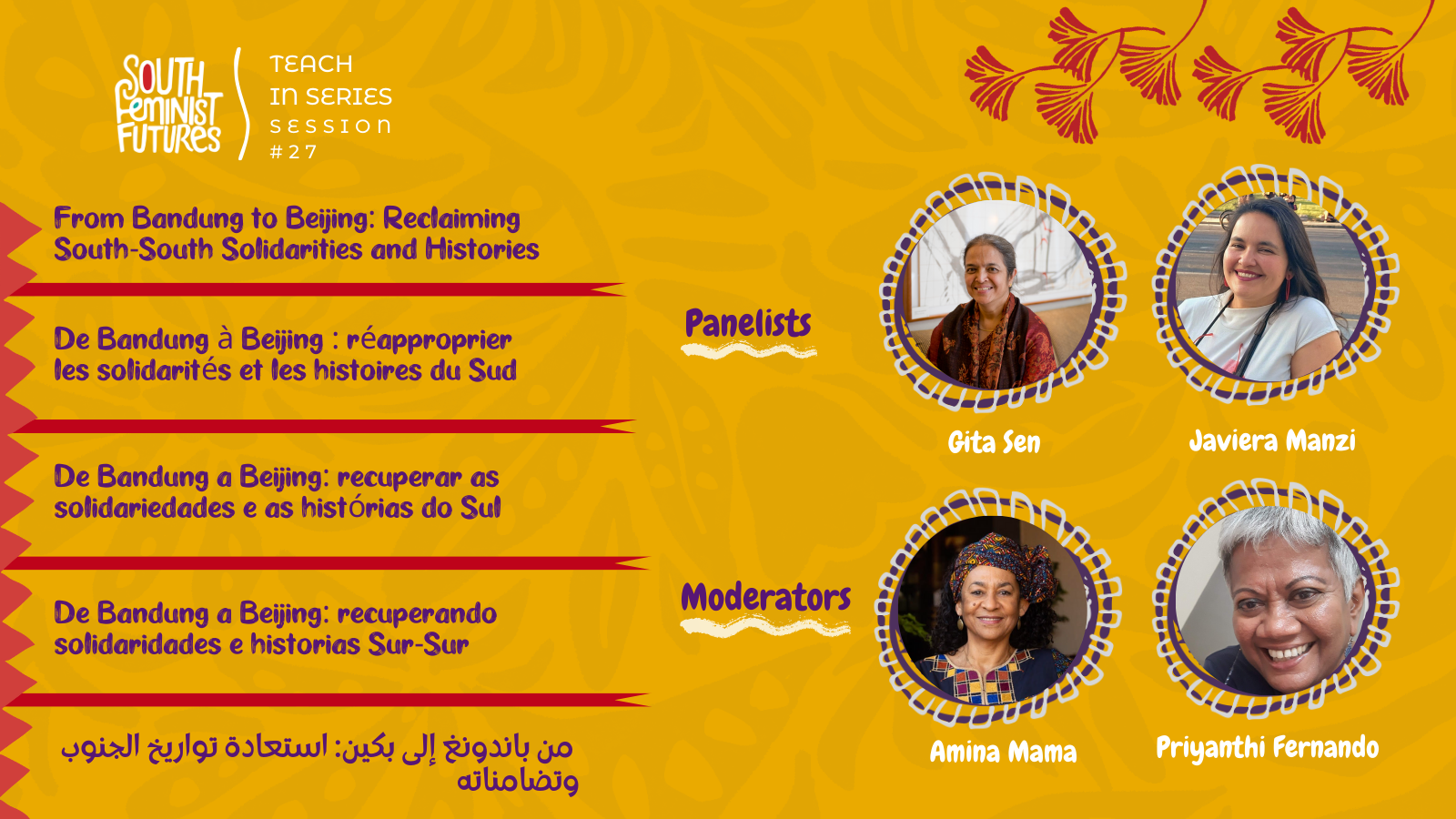On September 30th 2025, we held the 27th session of our Political Economy Teach-in Series: “From Bandung to Beijing: Reclaiming South-South Solidarities and Histories.” This special panel was moderated by Amina Mama and Priyanthi Fernando, and featured Gita Sen and Javiera Manzi.
The 1955 Bandung Conference, a milestone of Third World sovereignty and the birth of the Non-Aligned Movement, is often remembered as an event from which women were absent. However, the role of women’s groups and feminist in shaping that anti-imperialist internationalism is critical and undeniable. Groups such as Women’s International Democratic Federation (WIDF) played an essential role in embedding gender within anti-colonial and anti-capitalist struggles, not through simply inserting “women’s issues”, but rather bringing in political, materialist analyses of gender, race, class and empire. This stood in contrast to the often depoliticised and liberal frameworks promoted by Northern states and institutions. These contributions, quite crucial in the shaping of the “UN Decade for Women” (1975-1985), were fundamental to the lead-up to the 1995 Beijing Conference.
Seventy years after Bandung and thirty years after Beijing, we invited Southern feminists to look at our collective history, reclaim its narratives, and to ask: why should it matter today, and what do we take forward with us?
We hosted a powerful panel of brilliant speakers:
Panelists:
- Gita Sen – Gita Sen, a citizen of India, holds a PhD in Economics from Stanford University. Currently a Distinguished Professor and Senior Advisor of the Ramalingaswami Centre on Equity and Social Determinants of Health at the Public Health Foundation of India. She is a founding member of DAWN (Development Alternatives with Women for a New Era), a South feminist organisation working on analysis, advocacy, networking and capacity building. Sen has over 40 years of experience working nationally and internationally on gender equality, women’s human rights and SRHR, including in support of the follow up of the Cairo and Beijing conferences. A widely published author and editor, she has received the Volvo Environment Prize, and Honorary Doctorates from the University of East Anglia, the Karolinska Institute (Stockholm), the Open University (UK), the University of Sussex, and the University of Edinburgh.
- Javiera Manzi – Sociologist, archivist, and feminist activist with the Coordinadora Feminista 8M in Santiago, Chile. She is the general editor of ModernismoLatinoamericano.org, a digital platform that explores the trajectories of emancipatory projects and visual/material culture across the 20th century. Her PhD research in International History at the London School of Economics and Political Science examines Third World feminist and pacifist networks during the Cold War, with a focus on the work of Chilean Marxist historian Olga Poblete.
Moderators:
- Amina Mama – Amina Mama is Nigerian-British academic. She holds a Ph.D in organizational psychology from the University of London’s Birkbeck College, and works as a transdisciplinary feminist educator, researcher and organizer. She is currently a Professor in the Dept of Gender, Sexuality and Women’s Studies at the University of California, Davis. She has 40 years of experience working with African and transnational women’s movements and developing feminist studies curriculums at universities in Africa, Europe and the USA. She served 20 years as founding editor of the digital gender studies journal Feminist Africa and was the Kwame Nkrumah Chair in African Studies from 2020 to 2022. Amina continues to pursue her interests and activism through writing, collaborative action-research, documentation and film projects.
- Priyanthi Fernando – Priyanthi is a feminist, social development and communications specialist who has more than three decades of experience working in development, research and advocacy, leading organisations and teams involved in implementing programmes with and for women and other groups whose social, economic and political rights are not protected. She has done work in diverse cultural, political and socio-economic contexts in several countries of the global south, including some fragile and conflict-affected areas. Currently, she is the Executive Director of the Bandaranaike Centre for International Studies (BCIS), a well-established institute for teaching, research and public education in international relations in Colombo, Sri Lanka.
Our South Feminist Political Economy Teach-in Series aims to strengthen intergenerational dialogue and build a cross-regional feminist constituency. The series covers various topics to interrogate and strengthen understanding of issues shaping conditions in the Global South.
We have curated a special reading list of resources on the topic of this session, available on our South Feminist Knowledge Hub. It is designed to deepen your understanding of the themes and inspire meaningful discussion – featuring powerful contributions from authors and thinkers across the Global South.
